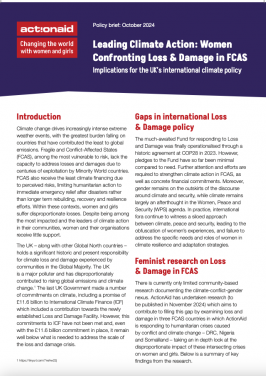Women Confronting Loss & Damage in FCAS
This brief looks at how climate change disproportionately impact FCAS countries and the climate-conflict-gender nexus.
Executive summary
Climate change drives increasingly intense and extreme weather events, with the greatest burden falling on countries that have contributed the least to global emissions. Fragile and Conflict-Affected States (FCAS), among the most vulnerable to risk, lack the capacity to address losses and damages due to centuries of exploitation by Minority World countries. FCAS also receive the least climate financing due to perceived risks, limiting humanitarian action to immediate emergency relief after disasters rather than longer term rebuilding, recovery and resilience efforts. Within these contexts, women and girls suffer disproportionate losses. Despite being among the most impacted and the leaders of climate action in their communities, women and their organisations receive little support.
The much-awaited Fund for responding to Loss and Damage was finally operationalised through a historic agreement at COP28 in 2023. However, pledges to the Fund have so far been minimal compared to need. Further attention and efforts are required to strengthen climate action in FCAS, as well as concrete financial commitments. Moreover, gender remains on the outskirts of the discourse around climate and security, while climate remains largely an afterthought in the Women, Peace and Security (WPS) agenda. In practice, international fora continue to witness a siloed approach between climate, peace and security, leading to the obfuscation of women’s experiences, and failure to address the specific needs and roles of women in climate resilience and adaptation strategies.
There is currently only limited community-based research documenting the climate-conflict-gender nexus. ActionAid has undertaken research which aims to contribute to filling this gap by examining loss and damage in three FCAS countries in which ActionAid is responding to humanitarian crises caused by conflict and climate change – DRC, Nigeria and Somaliland – taking an in depth look at the disproportionate impact of these intersecting crises on women and girls.
You can also read the full report, Women’s resilience in peril: Surviving loss and damage in conflict-affected DRC, Nigeria and Somaliland.
